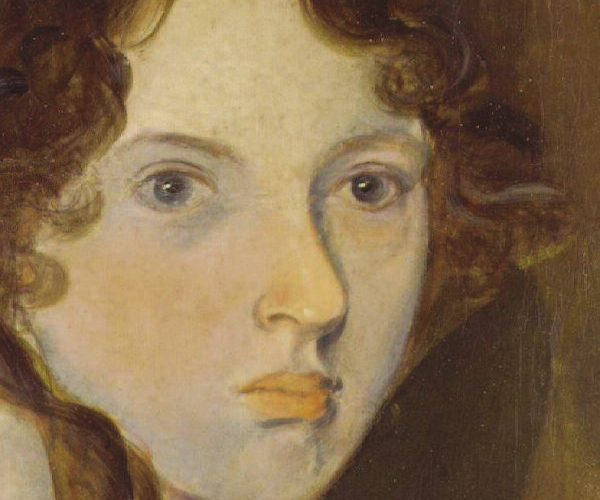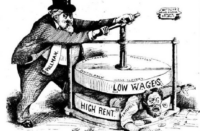30 July 2018 is the 200th anniversary of Emily Brontë’s birth. Her singular novel, Wuthering Heights (1847), challenges class society in an amazing way.
In the mid-1840s England was in the throes of the Industrial Revolution, as described by Engels in The Condition of the Working Class in England (1845). Growing up, the Brontë siblings saw the devastation of hand-workers, especially the handloom weavers in their region, and large-scale impoverishment. Their home lay near the Yorkshire mill towns, badly hit by the Hungry Forties. Their adult lives coincided with struggles against the Corn Laws, factory reform, strikes and the height of Chartism, famine in Ireland. All this affected the Brontës’ writings, in one way or another.
Wuthering Heights shocked the Victorian reader, as it still does today. It tells the story of Catherine Earnshaw and Heathcliff, a destitute, probably Irish child brought home by Mr Earnshaw from Liverpool. A deep bond develops between the children. The tomboy Catherine is expressly not the Victorian idea of a female. Earnshaw protects Heathcliff and insists that he be treated as a family equal. Catherine’s elder brother, Hindley, detests Heathcliff and torments him. After Earnshaw dies, this increases.
Catherine and Heathcliff, however, remain inseparable. In a crucial episode they roam towards Thrushcross Grange, home of the Linton family, the largest capitalist landowners nearby. The Victorian mansion is expensively furnished. When the Lintons see the two onlookers outside they let the bulldog loose on them.
Heathcliff is dismissed, whereas Catherine, deemed respectable, is treated for her wounds. She returns home a young lady. Not surprisingly for the reader, Edgar Linton asks Catherine to marry him. Her acceptance signifies Catherine’s betrayal of Heathcliff, of their absolute loyalty, their classless relationship. It triggers the tragedy.
Heathcliff, devastated, leaves Wuthering Heights, not to return for three years, after which he has acquired money and an understanding of law. He plans to beat class society at its own game. He gambles with Hindley, taking his property. He marries Isabella Linton in order to gain Linton property. He treats Isabella brutally, as just what she is in English law: his property. Isabella’s brother Edgar disowns her, literally. The institution of the Victorian family as a harbour of humanity is shattered at every level.
Heathcliff becomes master of Wuthering Heights and, many years after Catherine’s death, forces a marriage between his weakling son, Linton, and Catherine’s daughter, Cathy, again to acquire Linton property. With this action Heathcliff parodies, in a grotesque way, Catherine’s class marriage to Edgar. Everything is turned into its monstrous extreme.
Heathcliff works, lives and eats together with his servants, without great class distinction. There are no frills, no pretences of kindness. Heathcliff’s tenants are treated roughly. Women coming to the house, such as Isabella and later Cathy Linton, are stripped of their property, by marriage, and of their class comforts. They work for their living.
Hareton, Hindley’s son, is not educated and cannot read or write. Why educate a farm worker? Heathcliff has pared down all his dealings to the bare face of class law. There is no humanity. It is only in this stark, unmasked form that readers realise that this is the true nature of their own society. It is hyperbole, yes, but for that reason all the more effective in revealing the essence.
Heathcliff comes to mind in today’s world as the ruling class increasingly reveals its profound barbarity. There is less and less pretence of culture and humanity. Education and health are businesses, the state extracts itself progressively from a duty of care. Politicians set ever-decreasing value on a shallow veneer of humanity. We are seeing the beast for what it is, perhaps most grotesquely in Donald Trump but certainly not only in him.
The difference is that Heathcliff cannot reach personal fulfilment by living this way. He wreaks revenge on the class system, but the price is his own humanity, indeed his life. Class society is the root cause of Heathcliff’s inhumanity.
Emily Brontë’s unreliable narrators, Lockwood and Nelly Dean, also resonate today. They dupe the reader through their Victorian class lens. Readers cannot believe everything they say, must read between the lines, presume they are dealing with half-truths, omissions, and fake news.
Heathcliff responds humanely only when he is with Catherine, and in his torment after she dies. The reader’s lasting impression is the tragedy of Catherine and Heathcliff, whose absolute freedom from all dictates of hierarchy and class is the essence of their relationship. It reaches into a time when unequal gender difference is replaced by an equality of personhood.
In her implied utopian vision Emily Brontë anticipates a humane society, unrestrained by the class laws Heathcliff reveals to be brutally inhumane. If the meaning of life is to create conditions that are commensurate with humanity, then Emily Brontë’s remarkable novel highlights this. Her dream is yet to be achieved.






